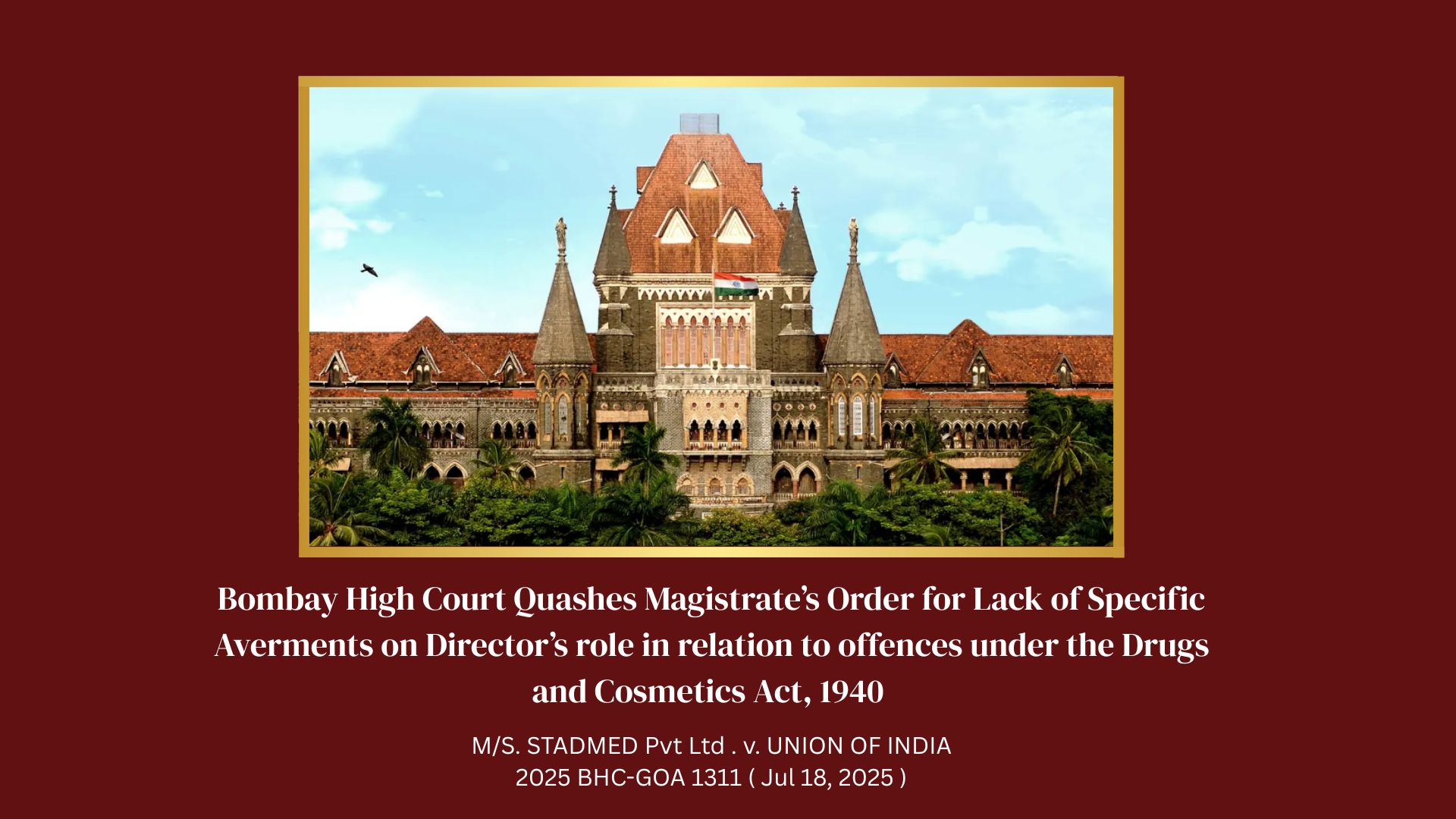
Bombay HC Quashes Magistrate’s Order for Lack of Specific Averments on Director for offences under the Drugs and Cosmetics Act, 1940
M/S. STADMED Pvt Ltd . v. UNION OF INDIA
2025 BHC-GOA 131
In this case, the Writ Petition challenged an order dated 18.03.2024 of the JMFC, Mapusa, passed in Criminal Case No. AOA/107 of 2024 taking cognizance of a complaint filed by the Respondent, Drug Inspector, alleging commission of offences by the Petitioners. Under Section-18(a)(i) of the Drugs and Cosmetics Act, 1940 punishable under Section 27(d) of the said act and Rules 1945.
The major contentions which were raised were that the Order taking cognizance and issuing process were cryptic, mechanical and reflected non-application of mind.
It was further contended by the Petitioner that the complaint filed before the Magistrate, does not incorporate a single allegation therein against the Petitioners No.2 to 5 who are Directors of the Petitioner No.1/Company, to the effect that these Directors were responsible to the Company for the conduct of the business of the Company and in the process of manufacture of the particular drug. Also It was argued that the vicarious liability of a Director, specifically referred to in Section 34, was required to be sufficiently pleaded to show the role of the Directors of the Company and how that role, in commission of the offence, was attributable to each one of them.
On the other hand, the Respondent argued that that paragraph 4 of the Complaint contains a specific averment that the Accused Nos. 2 to 5 were directors of the Company and were responsible for the day-to-day activities and the conduct of the business of the Company that manufactured the subject drug.
Decision
After hearing the both the parties the Bombay High Court observed that Section 34 of the Act creates a vicarious liability in every person, who at the time the offence was committed, was in charge of and responsible to the company charged of the offence, for the conduct of the business of the company it specifies that such person shall be guilty of the offence and will be proceeded against and punished accordingly.
Further, Court addressed the question as to what are the necessary averments that the complaint filed under Section 200 of the CrPC has to contain to foist the vicarious liability under Section 34 of the Drugs Act, on its Directors.
The case of S. M. S. Pharmaceuticals Ltd. v. Neeta Bhalla, 2005 4 MhLJ 731 was referred wherein the Supreme Court considered what specific averments are to be made in a complaint under Section 138 of the Negotiable Instruments Act against a Director of a Company, to bring home the vicarious liability under Section 141 of that Act. It has been held therein that there is a necessity to make specific averments in the complaint, that at the time the ofence was committed, the accused Director was in charge of and responsible for the conduct of a company, and that it is not sufficient to just state that the person was a Director. It further holds that the complaint must aver, as a fact, the manner in which the Director was in charge of and responsible for such conduct of business. As quoted below:
Para 9. “In view of the above discussion, our answers to the questions posed in the reference are as under: (a) It is necessary to specifically aver in a complaint under Section 141 that at the time the offence was committed, the person accused was in charge of, and responsible for the conduct of business of the company. his averment is an essential requirement of Section 141 and has to be made in a complaint. Without this averment being made in a complaint. the requirements of Section 141 cannot be said to be satisfied.
(b) he answer to the question posed in sub-para (b) has to be in the negative. Merely being a director of a company is not sufficient to make the person liable under Section 141 of the Act. A director in a company cannot be deemed to be in charge of and responsible to the company for the conduct of its business. he requirement of Section 141 is that the person sought to be made liable should be in charge of and responsible for the conduct of the business of the company at the relevant time. his has to be averred as a fact as there is no deemed liability of a director in such cases. (c) The answer to question (c) has to be in the affirmative the question notes that the managing director or joint managing director would be admittedly in charge of the company and responsible to the company for the conduct of its business. When that is so, holders of such positions in a company become liable under Section 141 of the Act. By virtue of the office they hold as managing director or joint managing director, these persons are in charge of and responsible for the conduct of business of the company. therefore, they get covered under Section 141. So far as the signatory of a cheque which is dishonoured is concerned, he is clearly responsible for the incriminating act and will be covered under sub-section (2) of Section 141.”
Further, the case of J. M. Laboratories & Ors. v. State of Andhra Pradesh & Anr., 2025 SCC OnLine SC 208 wherein, the Supreme Court considered the question as to what are the requirements of a valid order of issuance of process, and to what extent reasons are to be supplied by the Magistrate issuing such process, to sustain such an order under Section 202 of the CrPC. The relevant paragraph is quoted as under:
Para 38-“The order of issuance of process is not an empty formality. he Magistrate is required to apply his mind as to whether sufficient ground for proceeding exists in the case or not. he formation of such an opinion is required to be stated in the order itself. he order is liable to be set aside if no reasons are given therein while coming to the conclusion that there is a prima facie case against the accused. No doubt, that the order need not contain detailed reasons.”
Accordingly, the High Court observed that merely because a person is a Director of a Company, would not sufficient to fulfil the twin requirements of Sub Section 1 of Section 34 of the Drugs Act which are that the complaint must contain a specific averment against a Director showing how, and in what manner the Director was responsible for a conduct of a business of a company and how he was in charge of the day to day affairs of the company which has resulted in the commission of the offence.
The Bombay High Court observed as under
Para 16- “The complaint is devoid of any averment to demonstrate the role played of the Directors, roped in as Accused in the complaint nor is there any averment to state in what manner the offence was committed with their consent or their connivance or was attributable to their neglect or whether they were at all part of the manufacturing process of the drug. he necessary averments which are necessary for the provisions of Section 34 to apply are completely missing in the complaint for the Magistrate to have even considered issuing process. On this count alone, the impugned order dated 22.04.2024 issuing process would be required to be set aside.”
The High Court reiterated that the order issuing process is a one-line order stating “cognizance taken, issue summons to the Accused”. the order is absolutely devoid of any reason and does not even make a brief reference to the averments in the complaint.
Finally, the said order of the Magistrate was set aside and quashed by the Bombay High Court because the complaint was devoid of the required averments/statements to foist vicarious liability on the Directors of the company.
Click here to access the full Judgment
Note:
Cases related to Pharmaceuticals are highly technical and knowledge-driven. If you're searching for a drugs and cosmetics lawyer in India, a pharmaceutical lawyer, Mace Corporate Associates is the perfect place. If you are searching for a DPCO Lawyer for overcharging cases or DPCO Compliance, Mace can assist you well.
May it be a clinical trial Lawyer or a Medical device lawyer, Mace can be of great and perfect match for Pharmaceutical litigation. Mace has an accomplished track record for Not of Standard Quality Cases, Licensing Cases etc.

